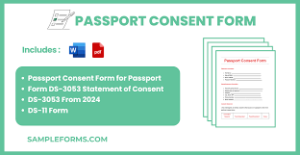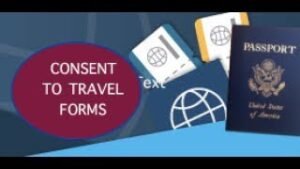Introduction
Overview of Passport Requirements for Minors
Parental Consent for Minor Passports Obtaining a passport for a minor involves specific requirements that differ from those for adults. A minor, typically anyone under 18, must have a passport to travel internationally. The process includes filling out an application form and providing proof of citizenship and identity. Each country has specific regulations on how to apply for a minor’s passport. Some countries may require both parents’ presence during application, while others accept consent forms from one parent.
Importance of Parental Consent
Parental consent is crucial for obtaining a minor’s passport. It ensures that all legal guardians are aware of and agree to the child’s travel plans. Consent helps prevent unauthorized travel and potential disputes. It protects the child from abduction risks and ensures that the travel is legally approved by both parents or guardians. Without proper consent, passport applications can be delayed or denied. Ensuring all required consent is obtained promotes smoother processing and travel safety.
Read more: Understanding Passport Expedited Services | Types of Expedited Services
Understanding Passport Requirements for Minors
Definition of a Minor
A minor is generally anyone under the age of 18. This age limit can vary by country. In most cases, a minor must obtain a passport for international travel. The definition of a minor affects the application process and required documents. Understanding this definition helps in preparing the correct paperwork.
Passport Types for Minors
Minors typically apply for regular passports, similar to adults. Some countries also issue diplomatic or official passports for minors in specific cases. Diplomatic or official passports are reserved for special circumstances involving government travel. The type of passport required depends on the purpose of travel. Ensure you apply for the correct type based on travel needs.
Common Misconceptions
One common misconception is that minors can apply for passports without parental consent. In reality, parental or guardian consent is usually required. Another myth is that the process is the same as for adults, which is not true. Minors often need additional documentation and approvals. Understanding these misconceptions helps in avoiding delays and complications in the application process.
Legal Framework for Parental Consent
Relevant Laws and Regulations
Parental consent for minor passports is governed by national laws and regulations. These laws ensure that both parents or legal guardians agree to the child’s travel. Most countries require documented proof of consent. Laws typically mandate that consent must be given in writing, often notarized. Regulations may also require additional documentation if parents are divorced or separated. Understanding these legal requirements is crucial for a smooth application process.
Differences by Country
The requirements for parental consent vary widely from country to country. Some countries require both parents to be present when applying for a minor’s passport. Others accept notarized consent forms from a single parent. Countries may also have different rules for legal guardians or third-party representatives. It is essential to research and follow the specific rules of the issuing country. Knowing these differences helps in avoiding complications and delays.
Importance of Compliance
Compliance with legal requirements is vital for obtaining a minor’s passport. Failure to adhere to these rules can lead to delays or denial of the application. Proper compliance ensures that all legal guardians are informed and agree to the travel plans. It also protects the minor’s safety and prevents unauthorized travel. Ensuring all requirements are met promotes a smooth and efficient passport application process.
Who Needs to Provide Consent?
Custodial vs. Non-Custodial Parents
Both custodial and non-custodial parents usually need to provide consent for a minor’s passport. The custodial parent is the one who lives with the child. The non-custodial parent, though not living with the child, still has legal rights. Many countries require written consent from both parents. If the non-custodial parent cannot provide consent, legal documentation or a court order may be needed. Understanding these requirements helps avoid delays or complications.
Guardians and Other Legal Representatives
Legal guardians or representatives must also provide consent if they care for the minor. Guardianship documents must prove their legal authority to act on behalf of the child. The process may involve notarized affidavits or court orders. This ensures that the person giving consent has the legal right to do so. It is crucial to provide all required legal documents to avoid issues with the passport application.
Special Cases (e.g., Divorced or Separated Parents)
Divorced or separated parents often face additional requirements for consent. One parent may need to provide proof of the other’s consent or involvement. Court orders or custody agreements may be necessary to show parental rights and obligations. Handling these special cases correctly is important for ensuring that the passport application is processed smoothly and legally.
Documents Required for Parental Consent
Standard Documentation
To obtain a minor’s passport, standard documentation typically includes a completed application form and proof of identity. Parents or legal guardians must provide their identification documents, such as a driver’s license or passport. Additionally, a birth certificate or adoption decree proving the relationship to the minor is required. Each parent or guardian must also submit a signed consent form. Ensuring that all documents are accurate and up-to-date helps streamline the application process.
Proof of Parental Rights
Proof of parental rights may be necessary if parents are separated or divorced. This proof often includes a custody agreement or court order. It verifies which parent has legal authority to make decisions for the minor. In cases where one parent cannot provide consent, a notarized affidavit or court order may be required. Providing clear documentation of parental rights ensures that all legal requirements are met and helps prevent delays.
Additional Documentation for Special Circumstances
Special circumstances, such as absent parents or legal guardians, require additional documentation. If a parent is unavailable, a court order or notarized affidavit may be necessary. Each unique situation demands specific paperwork to validate the consent process. Ensuring all additional documents are complete prevents complications and supports a smooth passport application.
Steps to Obtain Parental Consent
Preparing the Required Documents
Begin by gathering all necessary documents for parental consent. This includes identification for both parents or guardians. Obtain proof of relationship, such as a birth certificate. Complete the passport application form accurately. Ensure that each document is current and correctly filled out. Check for any additional requirements specific to your country. Organizing these documents beforehand helps prevent delays in the application process.
Submitting the Consent Form
Submit the completed consent form along with the passport application. Both parents or guardians may need to sign the form. Alternatively, some countries accept mailed or electronically submitted forms. Ensure that all required signatures are present and correctly dated. Verify submission guidelines with the relevant passport authority to ensure compliance.
Notarization and Legalization Requirements
Certain situations require notarization or legalization of documents. If a parent is abroad or unavailable, a notarized affidavit may be necessary. This may involve embassy or consulate services. Check specific requirements for notarization and legalization with your local passport authority. Properly completed notarization and legalization prevent processing delays and ensure the validity of the documents.
Common Challenges and Solutions
Disputes Between Parents
Disputes between parents can complicate the passport application process. It’s essential to provide a court order or written agreement that resolves the dispute. Both parents may need to attend a meeting or submit consent forms separately. Effective communication and legal assistance can help resolve conflicts and ensure the application proceeds smoothly.
Issues with Legal Guardianship
Legal guardians may face challenges in proving their authority to consent. Guardians must present detailed documentation of their guardianship status. This often includes a court order or guardianship decree. Ensure all documents are up-to-date and accurately reflect the guardian’s legal authority. Consulting with a legal professional can help address any issues.
Handling Missing or Unavailable Parents
Obtain a court order that authorizes the application process or provides an alternative consent method. In some cases, a notarized affidavit from the available parent or legal guardian may be sufficient. Providing comprehensive documentation and legal proof of the missing parent’s status can help resolve these situations.



